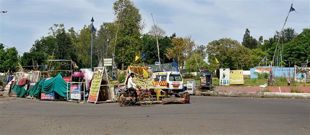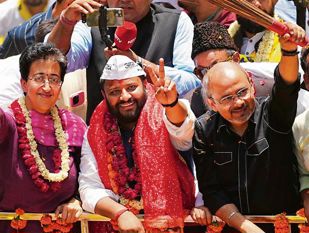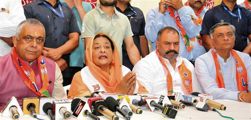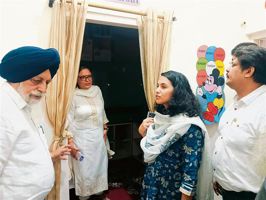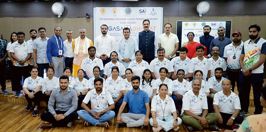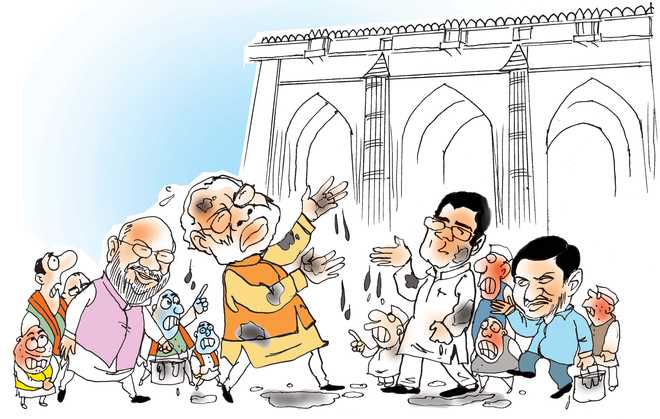
Illustration: Sandeep Joshi
Harish Khare
BY midday tomorrow, we should have a fairly good idea of the winners and the losers in this long-drawn out Gujarat affair.
It has been an un-elevating campaign. The political narrative became overloaded with unimaginable venom and rancour; so much toxic virulence has been introduced in the air that Gujarat simply cannot go back to its old normalcy after December 18. There will be a new normal.
Social harmony has been disrupted; there is tension and palpable disharmony, stoked by the politicians and their demand for votes and power. Village after village has been constrained to revisit its caste equations; realignments and readjustments have been effected, new tensions and apprehensions are lurking round the corner.
Over the last decade, Gujarat has settled down to a kind of equilibrium. All the assumptions behind that facile peace and tranquility have come under contestation. The status quo has been challenged — and, the new insurgents would not go back to their farms and villages.
Worse, reputations have not been enhanced. The Prime Minister has shown extraordinary interest and involvement in his home state. He has gone for broke. Whatever the final tally, his political persona would not remain unaffected.
And, if the Congress manages to produce a reasonable show, it would consecrate Rahul Gandhi’s Congress presidential innings.
The Election Commission did not exactly help enhance its own reputation as an empowered guardian of our electoral process when it allowed itself to be seen as going out of its way to accommodate the BJP in the matter of poll dates. It forgot the old dictum about Caesar’s wife. The national media, too, has not enhanced its image; but, it no longer cares.
The real hero of the 2017 election is neither Narendra Modi nor Rahul Gandhi; it is Hardik Patel. He has brought an aggressive energy into play, forcing the established political entities to summon a new resolve; a man, who is not yet old enough to qualify to contest the election, has emerged as the new face of a changed Gujarat. He has drawn huge, huge crowds to his rallies. He clearly got under the BJP’s skin. All that the BJP could do was inundate the social media with incriminating “CDs”, but the crowds kept coming.
Exit polls have predicted winners, but the only figure that counts is the December 18 tally. The Indian voter remains —has always been — an enigma.
After the great battle at the 1939 Tripuri session of the Congress, where Subhas Bose had got the better of Mahatma Gandhi’s nominee Pattabhai Sitaramiyya in the election to the post of the Congress President, Nirad C. Chaudhuri, the grand old, unsentimental, irreverent chronicler of the Indian mind, had offered an enduring insight into the Indian voter’s mind:
“...in any election, whether for government, municipal affairs or Congress, the Indian electorates would vote to satisfy their emotions and not to endorse any practical course, and Bose was serving the hotter curry.”
Did Modi serve a hot enough curry? Or did the others serve an equally hot or hotter curry? We will know only on Monday afternoon.
**************
ANYONE who wants to get an idea of what bitterness partisan politics can produce should glance through Ms Hillary Clinton’s What Happened. It is her take on why she lost to Donald Trump in last year’s US presidential elections. It is an animated and angry account. She righteously remains unreconciled to Trump’s victory. She insists that she was “as prepared as anyone could be” to be the President of the United States; and, she reminds the readers that “I may have two million more votes but he is the one sitting in the Oval Office.”
This racy book is remarkable on two counts. First, she does not flinch from calling Trump names. He is variously referred to as a “tabloid scoundrel,” a “right-wing crank,” a “bigot” and a “white nationalist.” According to Ms Clinton, Trump appealed to “the ugliest impulses of our national character” and made “false promises” and was “a con man.”
Secondly, What Happened tries to tell the role technology has come to play in electoral contests.
We have all known, in bits, how social media has become an essential part of political conversations and competitions. When Ms Clinton puts together in one place all the new dirty tricks available to combatants, the cumulative impact is frightening. It is almost chilling to realise that a foreign power — in this case, Russia — can make critical interventions in the most sacred internal democratic rite in another country.
As it is, the national leadership in each country laments the loss of its autonomy in this age of globalisation, but it is apparent that even the exercise of the “sovereign will” of the people can be manipulated from the outside. There are no walls that cannot be breached; after all, the email hackers do not need visas or work permits; all that they need is the protection and patronage of a powerful government or group.
In What Happened there is a section, “Trolls, Bots, Fake News and Real Russians”, where Hillary Clinton cites chapter and verse about how cyber attacks can muzzle opposition; how hacked information can be “weaponized;” and, how “active measures”, akin to covert intelligence operations, can be deployed to “shape an adversary’s political decisions.”
There is no doubt that leaders and groups all over the world would have drawn their own lessons from the last US presidential poll; social media platforms like Facebook, Reddit, Breitbart and Drudge Report got lured into purveying “false story lines.” For instance, Clinton talks of how “the Russians ‘flooded the zone’ with a vast network of fake Twitter and Facebook accounts.” She speaks of “the creation of fake affinity groups and community pages that could drive conversations online and draw in unwitting users.”
This technology, though, is available to anyone with resources, whatever the ideology.
**************
YESTERDAY, Rahul Gandhi formally took over as the President of the Indian National Congress, reviving the debate about dynasty and democracy.
Well, it seems, it is a very old debate. The other day, Mr K Jagannadha Rao, a former Editor (Sports), Press Trust of India, told me of this episode about Rahul Gandhi’s great grandfather Jawaharlal Nehru.
Mr Rao’s uncle K Iswara Dutt was a very famous journalist in the 1930s, based in Allahabad. For years, he was at that great institution, The Leader, and was deputy to its editor, Sir CY Chintamani. Then, as it happened, he had a tiff with his boss and left The Leader to set up, in 1934, an independent monthly, called the Twentieth Century. It, too, was published from Allahabad and had the (financial) support of Sir Tej Bahadur Sapru.
As Mr Rao recalled, “Once my uncle wrote a piece suggesting why the Nehru family be not declared the royal family of India. Pandit Nehru was not amused by the suggestion and went to Sir Tej, drawing attention to what Iswara Dutt had written. To which, Sir Tej responded, ‘Jawaharlal, Iswara Dutt has written what he thought was right and it was up to Jawaharlal to prove him wrong’”.
It is difficult to pinpoint when this Sapru-Nehru conversation took place; but we do know that in 1937, Nehru did write his famous article in the Modern Review (of Calcultta), with a suggestive heading, “We want no Caesars.”
I do wish the new President of the Indian National Congress finds time to read that essay.
The Virat Kohli-Anushka Sharma wedding is the first real good, cheerful news we have had in recent times. There has been too much gaali-gallauch, too much bad blood in the air.
No doubt, bad jokes will be told as and when Virat hits a lean patch, but for now, this simple, old-fashioned romance carried with it wholesome vibrations.
And then, a couple of days later it was so romantic to see my favourite batsman Rohit Sharma blowing a kiss to his wife in the stands during the Mohali one-day match against Sri Lanka.
I will raise my cup of coffee to the Sharmas and the Kohlis.






















